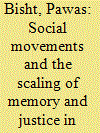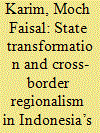|
|
|
Sort Order |
|
|
|
Items / Page
|
|
|
|
|
|
|
| Srl | Item |
| 1 |
ID:
175562


|
|
|
|
|
| Summary/Abstract |
The recent proliferation of China's railways has posed challenges to the dominance of the national-level railway authority on railway development. Since the 2000s, the planning of new railways has evolved into a politics of scale in which actors across multiple scales of government have bargained over railway alignment and station siting for their respective interests. This politics is shaped by the uneven bargaining powers of the contending state agents over railway planning. Interscalar division of regulatory oversight over strategic resources for railway development enables state agents at some scales to bargain more successfully, whereas variations in administrative and economic standing further differentiate the interscalar bargaining powers of municipal governments. Different results of bargaining across scales for each city have produced, as intercity railway planning in the Pearl River Delta illustrates, significant intercity variations in average travel times to the stations for the new railways that these cities share. Owing to the peculiar scalar distribution of the costs and benefits of the new railways, municipal governments with greater bargaining power have, contrary to traditional wisdom, bargained for less accessibility to intercity railway stations.
|
|
|
|
|
|
|
|
|
|
|
|
|
|
|
|
| 2 |
ID:
158940


|
|
|
|
|
| Summary/Abstract |
This paper examines the politics of scale in the commemorative work undertaken by the International Campaign for Justice in Bhopal (ICJB), a coalition of social movement organisations (SMOs) seeking justice for the victims of the Bhopal Gas Disaster of 1984. The argument traces how the ICJB attempted to contest the localisation of the disaster by the Indian state and the transnational corporations involved. I outline how the disaster, which had been scaled down from an extraordinary global event to a private non-issue, was re-scaled successfully across multiple scales of meaning and regulation through ICJB’s mobilisation of the frame of ‘second/ongoing poisoning’. This contestation over the scaling of the disaster crucially involved multiple processes of memory-work. Drawing on archival research and ethnographic fieldwork, this paper reveals how the remembrance of the disaster functioned as a key site of the discursive and performative re-framings required to reinstate multi-scalar accountability for the disaster. Overall, the paper establishes the utility of the politics of scale approach in mapping the dynamics of the transnational mobilisations of memory by SMOs in pursuit of justice.
|
|
|
|
|
|
|
|
|
|
|
|
|
|
|
|
| 3 |
ID:
167694


|
|
|
|
|
| Summary/Abstract |
This article examines how the decentralisation and fragmentation of the Indonesian state and resultant central–local dynamics affect cross-border regionalism in Indonesia’s periphery. It argues that cross-border regionalism projects are best understood as sites for scalar contestation over regulatory control between central and local government. Moreover, scalar contestation around cross-border regional projects is characterised by the struggles to control relationships with transnational capital between elites operating at different tiers of the state. When elites at different scales have conflicting interests and strategies, this can cause policy incoherence, inhibiting the development of cross-border regionalism. Conversely, when they align, and intersect with the interests of transnational business, cross-border regionalism can succeed. To illustrate the argument, this article utilises the comparative case studies of the Batam free trade zone and West Kalimantan–Sarawak cross-border cooperation.
|
|
|
|
|
|
|
|
|
|
|
|
|
|
|
|
| 4 |
ID:
120216


|
|
|
|
|
| Publication |
2013.
|
| Summary/Abstract |
This article examines how the politics of scale affect a process of dialogue led by civil society actors over fishing conflicts taking place at the local level in South Asia. The location is the Palk Bay and the fishers are Tamils from India and Sri Lanka. An agreement over fishing rights reached between these fishers in August 2010 remains largely unimplemented, but takes centre stage for this article, which examines the negotiation processes in terms of politics of scale and highlights the various difficulties encountered. Major pitfalls in a dialogue of this sort are the failure to recognise diversity within the population(s) involved and lack of recognition of the linkages of this population with other actors at different scales or levels. In a transboundary context, national and regional identities at times override local identity and interests, thereby making locally constructed solutions difficult, if not impossible, to implement.
|
|
|
|
|
|
|
|
|
|
|
|
|
|
|
|
|
|
|
|
|